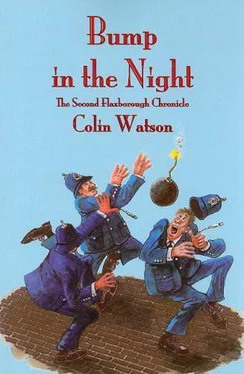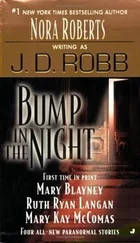“A hymn, perhaps,” suggested Kebble. He knew that the advertising manager would relinquish a pre-paid ‘mem’ as willingly as a leopard parting with a newly killed kid.
Grope shook his head. “A song,” he affirmed. “A ballad or something. Nothing religious.”
“Never mind; it doesn’t look as if it can do any harm.” Kebble slipped the sheet back into its tray.
Grope looked up at the ceiling. “It’ll come back to me,” he said. “I nearly had it just then.” He inflated his large grey cheeks and blew out air with a low, tuneless soughing noise. Kebble thought of graveyards.
A sniff announced the presence of Leaper. He came round the counter and strolled to his desk. The editor regarded him over his glasses. “What are you looking knowing about?” he asked.
Leaper turned. “Sir?”
Kebble fancied for a moment that he had seen Leaper smile. He sat upright with a look of alarm. The impression faded, however, and he relaxed. “All right, boy; have you something to write up?”
“A few pars.”
“Get on with them, then.”
Leaper sat before his typewriter, wound in a piece of copy paper and after five minutes’ reflection began to jab the keys. Grope looked up at the clock and said: “Ah, well.” He hated the noise of typing, Leaper’s above all: it sounded like sporadic small arms fire.
About half an hour after Grope’s departure, Leaper collected his copy and silently presented it to Kebble. As the editor read it through, an expression compounded of incredulity and horror overspread his face. “And what,” he hoarsely demanded at last, “is this supposed to be?”
“I thought it would be a good kick off for a sort of gossip feature,” explained Leaper, unabashed. “Like Tom Trenchant.” Mr Trenchant was the Daily Sun’s premier boudoir scourer. “Inside stuff,” Leaper added.
“You’ll have me inside if you persist in putting this kind of thing on paper. Take it away and burn it.”
Leaper stared. “Do you mean you’re spiking it, sir?”
Sighing, Kebble spread the sheets before him and motioned Leaper to his side. “You see, Leonard,” he said patiently, “on a local paper like ours we have to live with the people we write about. It does make a difference. Did you know that there are at least three shops here in Chalmsbury where you can still buy a horsewhip?”
“I’ve been careful about names.”
“Yes, I see you have. But I’m not sure that”—Kebble moved a finger quickly down the typescript—“yes, ‘socialite wife of police chief’—I’m not sure that identification is entirely ruled out there, old chap.”
“You could cut out ‘socialite’,” suggested Leaper.
Kebble shuddered. “I should have done that in any case. It isn’t the important point, though.” He pushed his fingers through his hair. “Let me put it this way. Chief Inspector Larch is a nice helpful fellow but a little on the dour side. I can’t imagine that he’d thank us for telling the town that his wife—how did you put it?—‘is to be seen at swank caravan parties, latest craze of the Chalmsbury Top Set’. What’s that, anyway? Sounds like teeth.”
“People are jolly glad to get into the Tom Trenchant column. And he doesn’t tone anything down.” Leaper paused and added: “Like I have.” He sensed that his employer lacked the Daily Sun’s admirable determination not to be gagged.
Kebble looked at him sharply. “Now what are you driving at?”
“Like I said, sir. I toned it down.”
“In what way? I don’t call a reference to...to ‘hairy-armed mystery playboy’ toning down.”
“Well, I didn’t write anything about her taking her clothes off.”
“What!”
Leaper shuffled. Then he looked Kebble in the eye and said defiantly: “I’m sorry now I hushed it up. Things like that ought to be exposed.”
Kebble opened his mouth, shut it, and began carefully tearing Leaper’s copy into small pieces. “Never,” he said, when the last had fluttered into the waste paper basket, “never do that again.” He breathed deeply and pondered the chance of Leaper’s ever appreciating the enormity of libel. The odds against, he decided, were astronomical.
“Leonard...just tell me what happened. I’d rather like to know.”
Leaper told him. By the time he had finished, Kebble was aglow and making little popping sounds. This disconcerted Leaper, who saw nothing amusing in a situation that his Fleet Street mentors would have treated with a proper blend of innuendo and self-righteousness.
“It’s all quite true, sir,” he protested.
Kebble raised a hand and pouted. “My dear boy, I don’t doubt it for a minute. Hilda Larch was always a little unpredictable. Like her mother.” He smiled fondly over his distended waistcoat, as if gazing down the years.
“You really don’t want me to write anything, then?”
The editor gave a start. “My God, no! Not a word in writing. Listen...”—he pointed to the machine room door and lowered his voice—“they’ve only to see a bit of paper with words on that somebody’s left about and they’ll set it. I have to watch them like a hawk. I think they come back at night, foraging. Haven’t you noticed the queer things that get in the paper sometimes? It was half a page of an old seed catalogue once. It had blown in from the street. The proof-reader should stop them, of course. But he’s too frightened. They’ve got him at their mercy in that little box of his.”
Leaper received the information in silence.
“So mind,” Kebble wound up, “don’t ever forget to clear your desk before you go home, or Bullock and his bloody crew’ll board it.”
That evening there was a meeting of the General Purposes Committee of Chalmsbury Town Council.
Councillor Pointer was in the chair and he awaited with some apprehension a question that he knew was going to be asked under ‘Any Other Business’.
It was Councillor Linnet, a truculent little man without teeth, who put it.
“Mr Chairman,” he began, the wind of public-spirited purpose whistling through his gums, “everybody in the town is getting very alarmed and anxious about all these explosions. They’re dastardly, Mr Chairman; there’s no question about that. Now what I want to know is what is being done in regard to putting whoever’s responsible under lock and key.”
The brief speech won a murmur of approval. At least six of the ten members present had already discussed the matter among themselves in the card room of the Mariners’ Club and decided on a vigorous joint bombardment of Chief Inspector Larch’s father-in-law.
Trying to assess the probable strength of his enemies as he glanced quickly round the chamber, Pointer saw that he had no chance of frustrating them with an outright refusal to accept Linnet’s question.
“I’m not sure,” he said carefully, “that this committee is competent to discuss the matter, is it? The detection of crime is the province of the police.”
Councillor Linnet was ready for this. “Come now, Mr Chairman,” he retorted, “public safety is involved in regard to this. We may not be a watch committee but we have every right to chivvy the police if we think they’re not being efficient in regard to protecting our rate-payers.”
“How do you know whether the police investigations are proceeding efficiently or otherwise?”
Linnet gave the ceiling a ‘hark-at-him’ grin. “We don’t need to have second sight to know that. There’s not been an arrest in regard to this business. And there should have been by now. I want to know what the police are doing.”
“The point with me, Mr Chairman,” put in a venerable gentleman with a white quiff and a dewlap, Alderman Haskell by name, “is that these terrible bombs, or whatever they are, are going off on public property. You’re quite right when you say it’s a job for the police; we all know that. But these aren’t what you might call private crimes. They’re a danger to everybody, like road subsidence and rickety buildings and all that sort of thing. We as a committee can’t just stand aside while the town’s being blown to bits.”
Читать дальше












